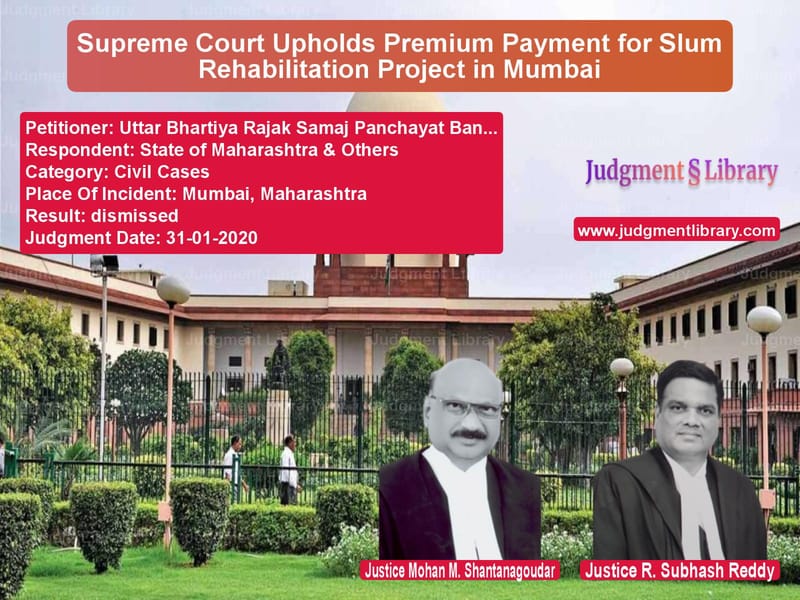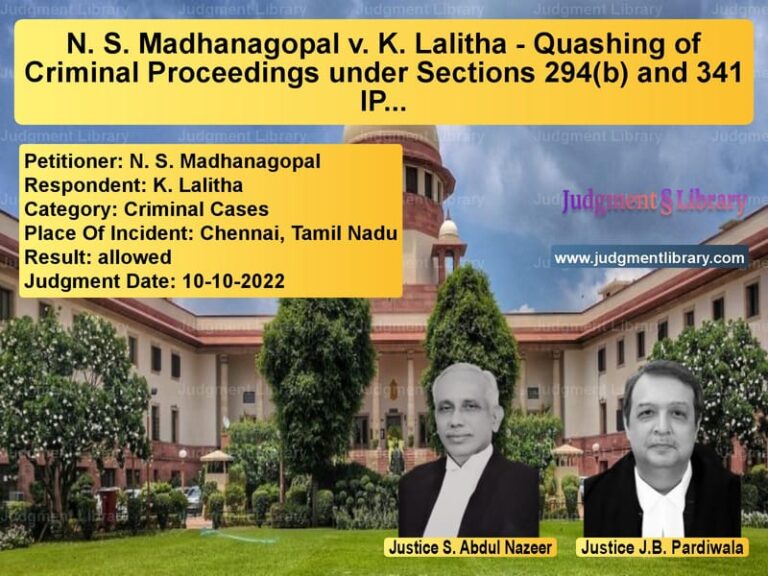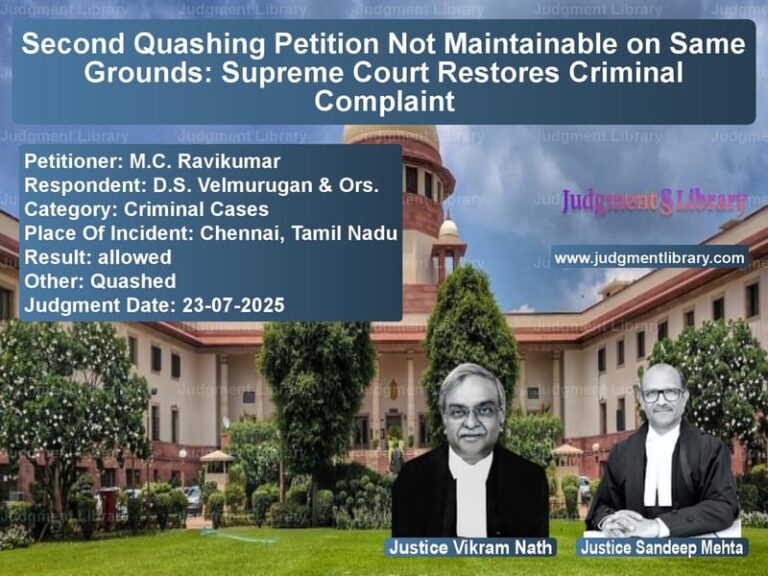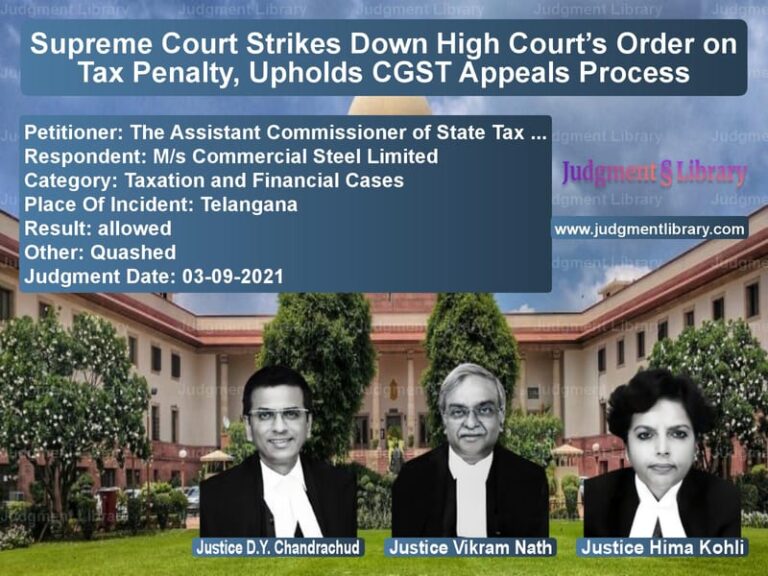Supreme Court Upholds Premium Payment for Slum Rehabilitation Project in Mumbai
The case of Uttar Bhartiya Rajak Samaj Panchayat Banganga Rajak Samaj Co-operative Housing Society & Another vs. State of Maharashtra & Others was a crucial ruling concerning the Slum Rehabilitation Scheme in Mumbai. The Supreme Court had to decide whether the demand for premium payment imposed by the Slum Rehabilitation Authority (SRA) under a new government directive was justified in the case of a project delayed due to pending environmental clearances.
Background of the Case
The appellant, Uttar Bhartiya Rajak Samaj Panchayat, is a registered society representing slum dwellers residing on Plot No. CS 51, 2/51, and 3/51 in Malabar Hill and Cumballa Hill Division, Mumbai. The second appellant was the developer engaged to execute a slum rehabilitation project under the Maharashtra Slum Rehabilitation Act, 1976.
On January 5, 2005, the Slum Rehabilitation Authority (SRA) issued a Letter of Intent (LOI) to the appellants under Development Control Regulation (DCR) 33(10), granting approval for the project. However, since the plot was located within the Coastal Regulation Zone (CRZ), the project was subject to clearance from the Maharashtra Coastal Zone Management Authority (MCZMA).
While awaiting environmental clearance, the Maharashtra government issued a directive on April 16, 2008, under Sections 37(1) and 154 of the Maharashtra Regional & Town Planning Act. This directive imposed a premium payment of 25% of the Ready Reckoner value for slum rehabilitation projects on government-owned lands. Subsequently, the SRA demanded Rs. 8.47 crore from the appellants as a premium payment for continuing the project.
Arguments by the Petitioner
The appellants, Uttar Bhartiya Rajak Samaj Panchayat and the developer, presented the following arguments:
- The Letter of Intent (LOI) was issued in 2005, long before the 2008 directive imposing the premium.
- The delay in obtaining environmental clearance from the MCZMA was beyond their control and should not lead to additional financial burdens.
- The premium demand was arbitrary and unfair, as the project was already approved before the new directive came into force.
- The government directive could not be applied retrospectively to projects that had already received approvals.
Arguments by the Respondent
The respondents, including the State of Maharashtra and the SRA, countered with the following arguments:
- The LOI issued in 2005 was valid for only three months, and the appellants failed to extend its validity.
- The government directive of 2008 applied to all slum rehabilitation projects on government land, regardless of when they were initiated.
- Since the appellants had not started construction before the directive was issued, they were liable to pay the premium.
- The demand for premium was in line with government policy and was legally enforceable.
Bombay High Court Ruling
The Bombay High Court dismissed the appellants’ writ petition in 2012, ruling that the premium demand was justified. The Court held that:
- The LOI had expired within three months of issuance, and the appellants had not taken any steps to extend its validity.
- The delay in obtaining environmental clearance did not exempt the appellants from complying with subsequent government directives.
- The 2008 directive applied to all projects, including those initiated before its issuance.
The appellants’ review petition was also dismissed in 2015, leading them to file an appeal before the Supreme Court.
Supreme Court Judgment
The Supreme Court upheld the Bombay High Court’s decision and ruled in favor of the State of Maharashtra. The Court made the following key observations:
“The validity of the Letter of Intent was only for three months. The appellants neither sought an extension nor completed necessary approvals within this period. Therefore, they cannot claim exemption from the premium imposed by the 2008 government directive.”
The Supreme Court further noted:
- Government policies affecting public land use can be modified through directives, and developers must comply with updated regulations.
- The premium demand was consistent with the law and could not be considered arbitrary.
- Failure to obtain environmental clearance within the LOI validity period did not entitle the appellants to exemption from subsequent directives.
- The government directive aimed to ensure uniform application of premium charges to all slum rehabilitation projects on public land.
Legal Precedents Considered
The Supreme Court referred to several key rulings:
- Maharashtra Regional & Town Planning Act Cases – Establishing the government’s authority to regulate development projects.
- Slum Rehabilitation Authority vs. Various Developers – Confirming that rehabilitation projects must comply with all updated policies and directives.
- Environmental Clearance Cases – Holding that project delays due to environmental approvals do not automatically grant exemptions from later regulations.
Final Outcome
The Supreme Court issued the following directives:
- The appeal was dismissed, and the appellants were directed to pay the premium as demanded by the SRA.
- The slum rehabilitation project could proceed only after full compliance with the 2008 directive.
- No further exemption or relief would be granted for delays caused by environmental clearance issues.
This ruling reaffirmed the government’s authority to regulate slum rehabilitation projects and ensure compliance with updated policies. The decision also set a precedent for similar cases where project delays led to disputes over retrospective application of new regulations.
Petitioner Name: Uttar Bhartiya Rajak Samaj Panchayat Banganga Rajak Samaj Co-operative Housing Society & Another.Respondent Name: State of Maharashtra & Others.Judgment By: Justice Mohan M. Shantanagoudar, Justice R. Subhash Reddy.Place Of Incident: Mumbai, Maharashtra.Judgment Date: 31-01-2020.
Don’t miss out on the full details! Download the complete judgment in PDF format below and gain valuable insights instantly!
Download Judgment: Uttar Bhartiya Rajak vs State of Maharashtra Supreme Court of India Judgment Dated 31-01-2020.pdf
Direct Downlaod Judgment: Direct downlaod this Judgment
See all petitions in Property Disputes
See all petitions in Landlord-Tenant Disputes
See all petitions in Damages and Compensation
See all petitions in Judgment by Mohan M. Shantanagoudar
See all petitions in Judgment by R. Subhash Reddy
See all petitions in dismissed
See all petitions in supreme court of India judgments January 2020
See all petitions in 2020 judgments
See all posts in Civil Cases Category
See all allowed petitions in Civil Cases Category
See all Dismissed petitions in Civil Cases Category
See all partially allowed petitions in Civil Cases Category







